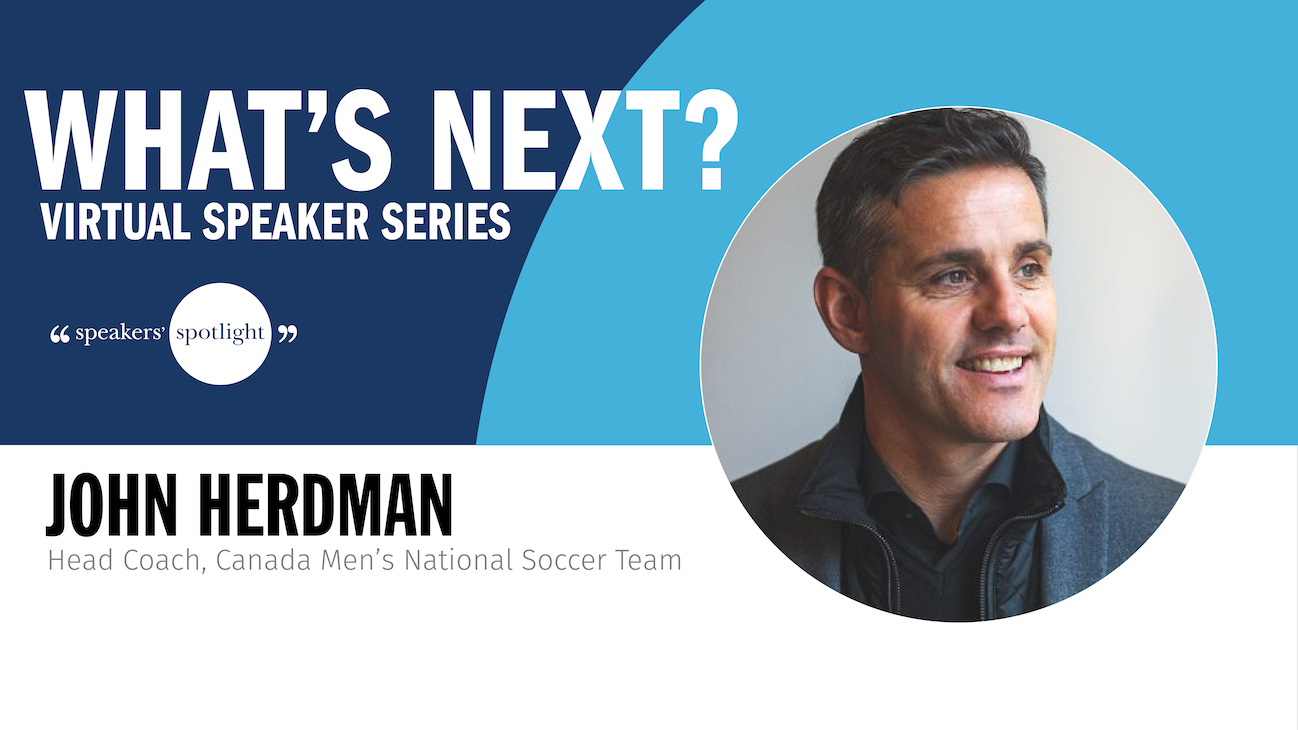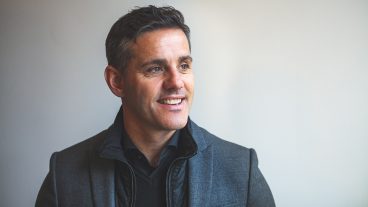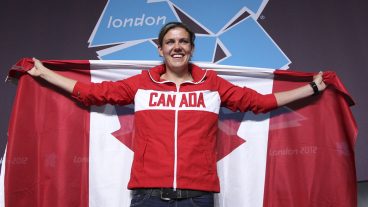“Never underestimate the power of the human will and spirit.” For the first time in 36 years, Canada is heading to the FIFA World Cup — a feat once thought impossible made possible by John Herdman, head coach of the Canadian men’s national soccer team.
Since taking the position in 2018, John has not only transformed the once struggling team into a World Cup qualifier but has also transformed Canada into a soccer nation. He’ll be the first to say that it was a team effort — no one individual is responsible — but he has been credited with revolutionizing how soccer is organized and delivered.
John came to Canada in 2011 to coach the Canadian women’s national soccer team, and work with arguably one of the best athletes in the world — Christine Sinclair. Under his leadership, the team won two back-to-back bronze medals at the Olympic Games; a gold medal at the Pan Am Games, the first in Canadian soccer history; and a top-six finish at the 2015 FIFA Women’s World Cup. Now as the coach of the men’s team, he’s led them to their first FIFA World Cup qualification since 1986.
We were fortunate to host John at our most recent Virtual Speakers Series event, where we explored not only his hopes for the team and Qatar 2022, but also the performance-improvement philosophies that influence his leadership style and foster such an effective high-performance culture. Below is a summary of our fireside chat with the one and only, John Herdman.
If you’re interested in attending our next Virtual Speaker Series event, email us at [email protected] to be added to the mailing list. Answers below have been edited for length.
Canada’s Journey to the World Cup
Speakers’ Spotlight: We’re about a month out from Qatar with your first game on November 23. How are you feeling?
John Herdman: The feelings are changing, as we get closer. The excitement is starting to take over, but there’s a trepidation, a nervousness there. It’s been 36 years since we’ve gone to the biggest event on the planet and it’s a completely different terrain, a different jungle, that we’re heading into with these young men.
Going to a World Cup is a dream come true for all of us and there’s excitement around the opportunity. But I’ve certainly had many sleepless nights of waking up in a cold sweat thinking of Kevin De Bruyne of Manchester who’s in the form of his life.
SpSp: What are some key elements that you can share with us on how you and your team got to this point today?
JH: I think everyone knows that what “we’ve” done has been a “we” approach. It was a huge team effort, a real collective from the board right down to the family of the players and our staff — the brilliant team behind the team.
When we came out of the Gold Cup, I felt that there was an absolute clarity for all of us about what we were trying to achieve here. We all saw this moment as a genuine opportunity to do something special for this country. And when you have clarity, that absolute clarity, it drives intent. And the intent creates an intensity in the workplace and in people’s ability to innovate and find that next level of performance. You’ve seen that on the field with the players. We won seven games out of 14 without Alphonso Davies, our star player, and we were still able to finish top, ahead of USA and Mexico.
How to Inspire Teams to Go Above and Beyond
SpSp: How do you convince your team that they are good enough to play on a world stage?
JH: It’s mindset, that’s the starting point of everything and then it’s experiential. Confidence will grow with each experience they gain.
I put this thought of being pioneers right at the forefront. Pioneering is being first and knowing what you can be first at. For us, it started with the small things — becoming some of the first Canadian male soccer players to do certain things like breaking the goal-scoring record. We were playing easier opponents, but we made every one of those matches do or die. Over four years, we hit 30+ firsts for Canadian soccer. Confidence is built through trust, including self-trust and that self-trust is built by hitting those little markers time and time again.
I think leaders are good at compartmentalizing mindset and only using it at the time they feel it’s important. But from my learnings, it’s a consistent process. Leaders need to ask themselves how often is mindset in their vernacular — are you driving your team to break new ground or to just consistently build on the ground that you’re already on?
SpSp: How do you create this pioneering mindset, from either a business standpoint or creative standpoint or even at home?
JH: I think the first thing is to understand the importance of mindset. Coming out of the pandemic, this was a time of immense change, and our brains don’t handle change well. We’ve all experienced some form of “small-T” trauma, whether at home or in business. Every time these traumas amass, our individual performance cages get tighter and tighter. At the bottom of it is fear, largely fear of failure, and at the top is our self-belief.
When you take on a group that hasn’t had success for 36 years at the international level, you know that performance cage is going to be there. As a coach, your job is to unlock and open it. It’s about gradually expanding the ceiling and floor and eroding that fear of failure.
The pioneering mindset was critical to us. From the first team meeting I said, we’re qualifying for 2022. You have to make those big statements to get them thinking this way, and then underneath this, do the work to unravel the mindset limitations and blockages that have been holding them back.
SpSp: While coaching both the women’s and men’s teams, you brought them above and beyond what was expected. Was it the same philosophy or mindset that you used with both teams?
JH: I have a performance trident that I operate with — a clear philosophy on what high performance is and how to craft a culture that caters to high performance people. If you want to describe it, it’s a gritty culture of high demand, high support.
It starts with team spirit. When you unpack team spirit, right at the core is trust, and trust leads to safety. When you bring people together with a shared purpose, a shared agenda, then trust starts to emanate. For me, that’s the starting point. Get this group of men or women on the same page to understand that this journey was bigger than them. The what, the why, and the who was clear and it was a consistent theme that ran through whatever we did.
The next piece of the performance trident is tactical excellence. And you can apply this to business — this is your strategy, key performance indicators, objectives, etc. But ultimately for us, it’s getting the right person on the right blade of grass at the right time to make a difference on the field, and then ultimately 11 players doing the same. But you can’t do this without that trust and safety.
With safety and clarity, you get the third piece — team chemistry. As a leader, it’s about understanding the potential of people when they live in these environments; it’s this that gets them to push beyond their limits.
You’re going to want to watch John unpack his performance trident himself. Enjoy the clip below!
Qatar 2022: What’s Next for Canada
SpSp: What do you see happening with this team at Qatar 2022?
JH: This is a completely new terrain. The world stage is next level, and next-level Canada is something we have to develop and build from mindset, skillset, and structure.
The reality is there’s some gaps we have to close, but the mindset is, David fought Goliath. We’re going to fight giants in every game, but each of them will have their weaknesses. When we come up against a giant, we can’t fight like a giant, we have to know what our X factor is in those moments and double down in those areas. It’s a mindset and a leap of faith — a mustard seed of faith — that we’ve got to have with that Canadian grit, that swagger an Alpohonso Davies can bring to a field of Jonathan Davids.
To score that first goal and know that our fans are celebrating the first Canadian goal in a World Cup, would be a dream come true for us. Either way, it’s a win-win. What we get out of this tournament is the organizational knowledge that’s been missing. It’s going to be my first male world cup, the players’ first, the organization’s first; no one is still here from the 1986 World Cup. No organizational knowledge transferred. But now, coming out of Qatar, we’ll be even more ready to compete on our own soil when the World Cup comes home in 2026.
Contact us to learn more about John and what he can bring to your next event.



